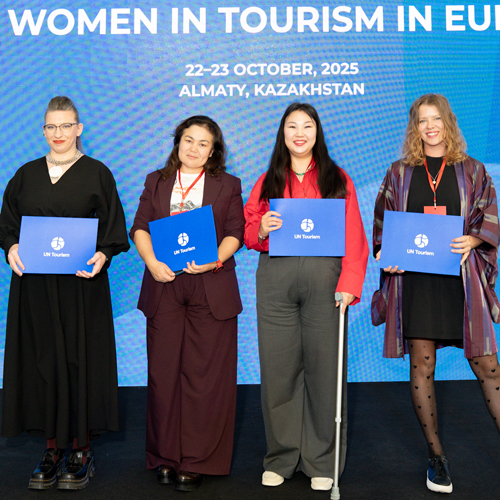University of Houston Course Cancellation: An Analysis of Impacts on Sustainable Development Goals
Executive Summary
The University of Houston’s Graduate College of Social Work has discontinued a mandatory course, “Confronting Oppression & Injustice,” without faculty consultation. This report analyzes the decision’s direct and adverse implications for the university’s alignment with key United Nations Sustainable Development Goals (SDGs), particularly SDG 10 (Reduced Inequalities), SDG 4 (Quality Education), SDG 5 (Gender Equality), and SDG 16 (Peace, Justice, and Strong Institutions).
Violation of SDG 10: Reduced Inequalities
The discontinued course was fundamentally aligned with the objectives of SDG 10, which calls for reducing inequality within and among countries. The curriculum was designed to equip future social work professionals with the critical understanding necessary to address systemic inequalities.
- Core Focus on Inequality: The course syllabus centered on examining intersectional social justice issues that are the primary targets of SDG 10.
- Targeted Topics Removed: The cancellation eliminates formal instruction on key drivers of inequality, including:
- Race and colorism
- Classism
- Ability and disability
- Other structures of power and prejudice
- Impact on Professional Practice: By removing this training, the university impedes the ability of its graduates to effectively contribute to reducing societal inequalities, a core tenet of both the social work profession and SDG 10.
Detriment to SDG 4 (Quality Education) and SDG 5 (Gender Equality)
The decision undermines the principles of inclusive and equitable quality education (SDG 4) and the promotion of gender equality (SDG 5). Specifically, it conflicts with SDG Target 4.7, which advocates for education that promotes sustainable development, human rights, and gender equality.
- Erosion of Quality Education (SDG 4): The unilateral cancellation, reportedly driven by external political pressure rather than academic review, compromises the integrity and quality of the educational curriculum. The American Association of University Professors chapter at the university noted that such actions censor ideas and harm students’ learning.
- Setback for Gender Equality (SDG 5): The course explicitly included discussions on gender and sexual orientation. Its removal from the required curriculum represents a significant step backward in institutionalizing education that promotes gender equality and challenges discriminatory social norms.
Contradiction of SDG 16: Peace, Justice, and Strong Institutions
SDG 16 emphasizes the need for effective, accountable, and inclusive institutions at all levels. The process by which the course was canceled raises serious concerns about the university’s institutional governance and its commitment to these principles.
- Lack of Inclusive Process: The decision was made without a faculty vote or discussion, contravening the principles of inclusive and participatory decision-making essential for a strong institution.
- Failure of Accountability: The administration provided no substantive explanation for the cancellation, failing in its duty of accountability to students and faculty. The official email cited vague “upcoming changes to the curriculum” without further detail.
- Weakened Institutional Integrity: The action, perceived as a response to political pressure related to Texas Senate Bill 37, suggests a weakening of the university as an independent and just institution, prioritizing political compliance over academic and social justice principles central to SDG 16.
Analysis of Sustainable Development Goals in the Article
1. Which SDGs are addressed or connected to the issues highlighted in the article?
-
SDG 4: Quality Education
- The article’s central theme is the alteration of a university curriculum, specifically the removal of a required course at the University of Houston’s Graduate College of Social Work. This directly pertains to the quality, content, and governance of higher education.
-
SDG 10: Reduced Inequalities
- The cancelled course, “Confronting Oppression & Injustice,” was designed to “examine a set of intersectional social justice issues, centering race.” Its syllabus included topics like racial prejudice, gender, sexual orientation, classism, and disability, all of which are core to understanding and reducing societal inequalities.
-
SDG 16: Peace, Justice and Strong Institutions
- The article highlights issues with institutional governance and academic freedom. The decision to scrap the course was made “without any faculty input” and with “no faculty vote,” which undermines principles of inclusive and participatory decision-making within an institution. Furthermore, the action is framed as a response to “intense political pressure on Texas universities to censor content,” which challenges the strength and independence of educational institutions.
-
SDG 5: Gender Equality
- The course curriculum explicitly included “gender” and “sexual orientation” as scheduled topics. Removing a course that educates future social workers on these subjects is relevant to the broader goal of promoting gender equality and understanding the structures that perpetuate gender-based discrimination.
2. What specific targets under those SDGs can be identified based on the article’s content?
-
SDG 4: Quality Education
- Target 4.7: Ensure that all learners acquire the knowledge and skills needed to promote sustainable development, including, among others, through education for human rights, gender equality, and promotion of a culture of peace and non-violence. The cancelled course was designed to provide this exact knowledge, covering “social justice issues,” “racial prejudice,” “gender,” and “anti-oppressive practice.” Its removal is a direct setback for this target.
-
SDG 10: Reduced Inequalities
- Target 10.2: Empower and promote the social, economic and political inclusion of all, irrespective of age, sex, disability, race, ethnicity, origin, religion or economic or other status. The course aimed to equip social work students with the tools to understand and confront oppression, which is fundamental to promoting the inclusion of marginalized groups discussed in the syllabus (e.g., based on race, gender, disability).
- Target 10.3: Ensure equal opportunity and reduce inequalities of outcome, including by eliminating discriminatory policies and practices. The course’s focus on “larger structures of power” and “anti-oppressive practice” is directly related to educating professionals on how to identify and work towards dismantling discriminatory systems.
-
SDG 16: Peace, Justice and Strong Institutions
- Target 16.7: Ensure responsive, inclusive, participatory and representative decision-making at all levels. The article explicitly states the decision was made “without any faculty input” and there was “no discussion, no faculty vote,” indicating a failure to meet this target within the university’s governance structure for curriculum changes.
- Target 16.10: Ensure public access to information and protect fundamental freedoms. The cancellation is linked to political pressure to “censor ideas and viewpoints,” which infringes on the fundamental freedom of academic inquiry and teaching, a cornerstone of strong educational institutions.
3. Are there any indicators mentioned or implied in the article that can be used to measure progress towards the identified targets?
-
For SDG 4 (Target 4.7)
- Implied Indicator: The existence and content of curricula dedicated to human rights, social justice, and equality in higher education. The article provides a clear data point: a required course titled “Confronting Oppression & Injustice” was part of the curriculum and is now “no longer part of our curriculum.” This represents a negative change for this indicator.
-
For SDG 10 (Targets 10.2 & 10.3)
- Implied Indicator: The extent to which professional training programs (like a Master of Social Work) include education on systemic inequality and anti-discriminatory practices. The article details the removal of course topics such as “critical race theory,” “intersectionality,” “race and colorism,” “gender,” “sexual orientation,” “classism,” and “disability,” indicating a reduction in this type of education.
-
For SDG 16 (Targets 16.7 & 16.10)
- Implied Indicator for 16.7: The presence of participatory faculty governance in university decision-making processes. The article provides evidence of its absence in this case, noting, “there was no discussion, no faculty vote, just an email saying the class no longer exists.”
- Implied Indicator for 16.10: Reported instances of political interference or censorship in academic curricula. The statement from the American Association of University Professors chapter, which condemns the “intense political pressure on Texas universities to censor content that some find objectionable,” serves as a direct report of such an instance.
Summary Table of Findings
| SDGs | Targets | Indicators (Implied from Article) |
|---|---|---|
| SDG 4: Quality Education | 4.7: Ensure all learners acquire knowledge and skills for sustainable development, including human rights and gender equality. | The existence of a required course on social justice (“Confronting Oppression & Injustice”) in the Master of Social Work curriculum, which the article states has been removed. |
| SDG 10: Reduced Inequalities | 10.2: Promote social, economic, and political inclusion of all.
10.3: Ensure equal opportunity and reduce inequalities of outcome. |
Inclusion of topics like “race,” “gender,” “sexual orientation,” “classism,” and “disability” in the curriculum for social work professionals. The article confirms these topics were part of the cancelled course. |
| SDG 16: Peace, Justice and Strong Institutions | 16.7: Ensure responsive, inclusive, and participatory decision-making.
16.10: Ensure public access to information and protect fundamental freedoms. |
The use of faculty governance in curriculum decisions (the article states there was “no faculty vote”).
Reported instances of political pressure to censor university course content (cited by the AAUP chapter). |
| SDG 5: Gender Equality | 5.1: End all forms of discrimination against all women and girls everywhere. | The inclusion of “gender” and “sexual orientation” as specific topics in educational curricula designed to address social justice and discrimination. |
Source: insidehighered.com







